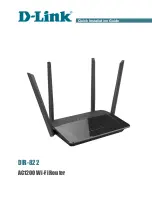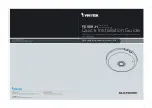
18
the SIP proxy server domain name. The phone will then use
the domain name in
Domain Name
field as part of SIP URL
but send and receive SIP messages through the SIP proxy
server defined in the
Service Domain
field.
IP Address
Enter the IP address of the SIP Server in this field.
Domain Name
Enter the domain name corresponding to the IP address
entered above in this field.
Port
Enter the SIP server’s listening port for the SIP in this field.
Leave this field set to the default if your VoIP service
provider did not give you a server port number for SIP.
Secondary SIP Server
The Secondary Features (FQDN, IP address, domain name
and port), act as a backup for the initial connections’ settings.
In the event that the connection with the SIP server is lost,
the backup settings will be used.
Outbound Proxy
The Outbound Proxy is a normal SIP proxy. If instructed to
do so by your ISP, enable the Outbound Proxy, and enter its
IP address, Domain Name and Port Number in the
appropriate fields.
Service Domain
Enter the SIP service domain name in this field.
URL Format
Select
SIP-URL
to have the router include the domain name
with the SIP number in the SIP messages that it sends.
Select
TEL-URL
to have the router use the SIP number
without a domain name in the SIP messages that it sends.
User Parameter
You can set this to
phone
or
none
. This determines
whether or not the phone number is appended to the
information forwarded to your SIP server. Your VoIP
service provider will instruct you which setting to use.
Caller ID Delivery
Use this pull-down menu to initiate the delivery of the
inbound caller ID.
Display CID
Use this pull-down menu to enable or disable the display of
the Caller ID.
Timer T2
Set the timer to 4, 8, 16 or 32.
Initial Unregister
Enable or disable the initial unregister.
Register Expiration
Use this field to set how long the router will wait before
sending a repeat registration request if a registration attempt
fails or there is no response from the registration server.
















































